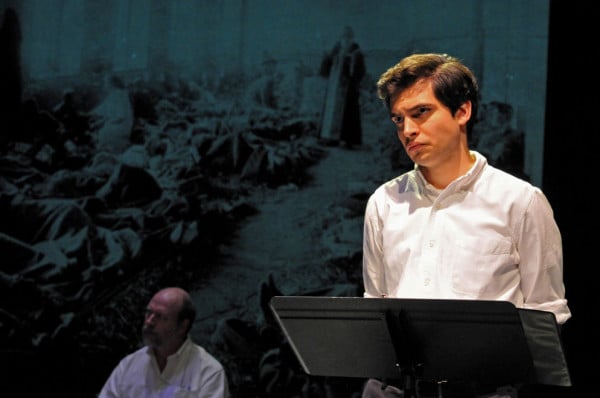
“In a thousand years, this war will be utterly forgotten,” says actor Thomas Freeland about World War One in “Words to End All Wars.” Last weekend at Pigott Theater, Stanford Repertory Theatre premiered a staged reading of the beautiful and haunting new work “Words to End All Wars,” compiled and directed by Rush Rehm, as an effort to make sure the atrocities of World War One are not forgotten.
The content of the piece is bleak, yet this bleakness powerfully supports Rehm’s mission to use words to “question, and even abandon, our readiness to engage in organized global violence.” While this goal is quite ambitious, the grandness Rehm’s mission shined through all elements of the production, creating a passionate and moving evening of theatre that appeared to have a larger purpose.
The piece is a series of vignettes borrowing from several texts, including first-person accounts of the war to poems and novels written about the war, artfully compiled into an evening of theatre. For each vignette, a short biography of author who wrote the text and photographs from the war are displayed on a projection screen, consistently and effectively reminding us of the history that is being brought to life by the actors. The performance in front of the screen is a simple, script-in-hand reading, with no set pieces and uniform costumes consisting of white shirts and black pants or skirts, directing our attention toward the text
While the texts are powerful, they are also gruesome, detailing some of the most horrifying aspects of the war. An all-around talented cast brings to life the challenging texts. While the cast features a mix of students and professionals, each member of the ensemble presents themselves in a professional and poised manner. It is clear that Rehm worked with each of them closely on the language, for each actor speaks with a clear sense of what they are saying, strong emotional vulnerability, and an adept use of vocal work, especially involving the use of different accents.
Thomas Freeland, a lecturer in Stanford’s oral communications department, is a major standout in the production. A high point of the evening is his a monologue exposing the hypocrisy of the economic gains of war in contrast with war’s cost in lives, which he delivers with a resonant, versatile voice and an ardent sense of disdain. Alex Johnson, a TAPS graduate student, also delivers each of his monologues with precision, passion and a strong physical embodiment of his characters. This production highlights some of the best acting on-campus, and the simple, artful direction focused on the intricacies of the text succeeds in making the language come alive.
It may be unrealistic to assume that art can change the world, but this production is a valiant and well-executed attempt to both remember World War One and educate audiences about the horrors of war. As Rehm says in his Director’s Note in the program, “Words are never enough. But if any words can help to end war, then those you hear this evening are surely among them.”
Contact Steve Rathje at srathje ‘at’ stanford.edu.
